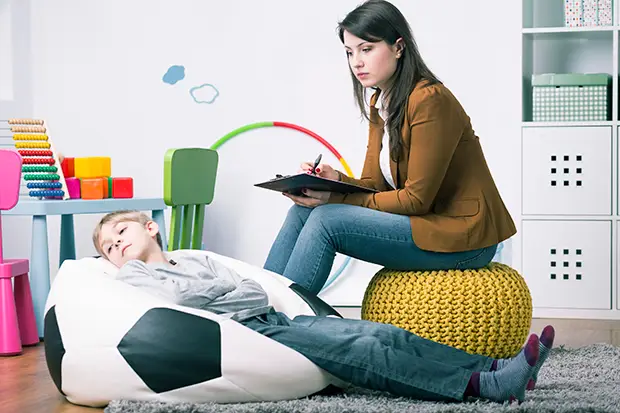
Submitted by Anjum Bashir, MD
Attention deficit hyperactivity disorder (ADHD) is one of the most common childhood disorders and can continue through adolescence and adulthood. While there is no “cure” for ADD/ADHD, it can be successfully managed with a combination of medication and behavior therapy. Last month, we discussed the use of medication. Let’s look at the role of behavior therapy in treating ADHD.
What Is Behavior Therapy?
Behavior therapy aims to help a person change his or her behavior. Therapy is very individualized and will be different depending on the person’s age, personality, and symptoms. A therapist works with a child to help him or her learn how to monitor their own behavior—for example, learning and practicing specific techniques to control anger or to think before acting. Therapists may teach children social skills, such as how to wait their turn, share toys, ask for help, or respond to teasing. When treating children with ADHD, the therapist will also be working with parents and other family members.
Children with ADHD need guidance and understanding from their parents and teachers to reach their full potential and to succeed in school. Before a child is diagnosed, frustration, blame, and anger may have built up within a family. Parents and children may need special help to overcome bad feelings. A qualified mental health professional will help parents and children develop new skills, attitudes, and ways of relating to each other.
Parenting skills training helps parents learn how to use a system of rewards and consequences to change a child’s behavior. Parents are taught to give immediate and positive feedback for behaviors they want to encourage and to ignore or redirect behaviors they want to discourage. Parents are also encouraged to notice and point out what the child does well and to praise the child’s strengths and abilities. They may also learn to structure situations in more positive ways. For example, they may restrict the number of playmates to one or two so that their child does not become overstimulated. Parents may benefit from learning stress-management techniques to increase their own ability to deal with frustration so that they can respond calmly to their child’s behavior.
How Can Parents Help?
Following are some examples that can help parents with a child’s behavioral therapy. These techniques are also effective for teens and adults with ADHD where there isn’t as much parental involvement.
Create a routine. Try to follow the same schedule every day, even on weekends and holidays.
Get organized. Put schoolbags, clothing, and toys in the same place every day. Use homework and notebook organizers, including electronic systems. It can be a trial and error process to find what works best for each individual.
Avoid distractions. Turn off the TV and computer, especially when your child is doing homework.
Limit choices. Offer a choice between two things (this outfit, meal, toy, etc. or that one) so that your child isn’t overwhelmed.
Change your interactions with your child. Use clear, brief directions to remind your child of responsibilities and establish consistent rules they can understand and follow.
Use goals and rewards. Use a chart to list goals and track positive behaviors, then reward your child’s efforts. Be sure the goals are realistic—baby steps are important!
Discipline effectively. Use timeouts or removal of privileges as consequences for inappropriate behavior instead of yelling or threatening.
Help your child discover a talent. All kids need to experience success to feel good about themselves. Finding out what your child does well can boost social skills and self-esteem.
Exercise, Nutrition, and Sleep
Certain lifestyle changes will often be beneficial for individuals with ADHD. We know that exercise increases the levels of “feel-good” hormones for anyone. For someone with ADHD, this can act like a “mini dose” of Ritalin or Adderall! Everyone functions better with good nutrition, but it can also play a role in managing symptoms of ADHD. A healthy, balanced diet that limits the amount of processed foods and sugar can make a significant difference. Another often-overlooked factor in managing ADHD symptoms is the quality of sleep. Sleep impacts everyone’s health, mood, and ability to concentrate, and for those with ADHD, lack of good quality sleep will usually make symptoms worse. In fact, sometimes a sleep problem is misdiagnosed as ADHD!
If an individual does not respond to a treatment plan of medication and behavioral therapy, then the original diagnosis of ADHD should be reviewed. As mentioned in previous articles, ADHD can be difficult to diagnose. The traditional method of gathering information about a person’s behavior and determining if the hyperactivity, inattention, and impulsivity meet the criteria for ADHD is quite subjective and prone to error. A new technology called the Quotient® ADHD System is available that can diagnose ADHD with greater certainty. Using this test, which takes about 15 minutes, can help assure that you don’t start treatment for ADHD if a different issue is causing similar symptoms.
While there is no cure, proper diagnosis and treatment can eliminate or control many of the symptoms so that people with ADHD can be successful in school and lead productive lives.
For more information on Quotient Testing for ADHD diagnosis, TMS Therapy for depression, or any mental illness, please contact Anjum Bashir, MD at 217-422-0027. He is one of the few physicians in Central Illinois offering TMS Therapy and Quotient Testing. His Bloomington office is located at 205 N. Williamsburg, Suite D, and he also has an office in Decatur. TMS therapy is covered by many insurance companies, including BCBS.
Photo credit: KatarzynaBialasiewicz/iStock

